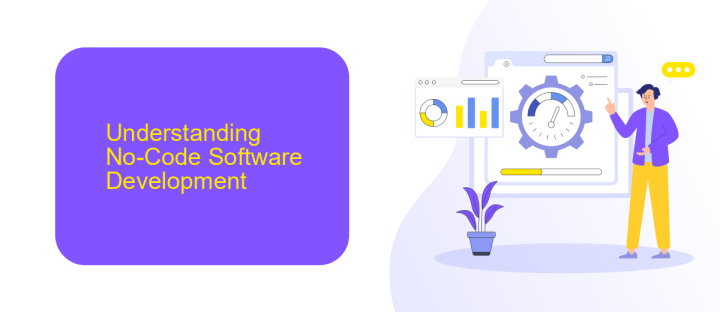No-Code Software Developer
In today's rapidly evolving tech landscape, the role of a no-code software developer is becoming increasingly vital. No-code platforms empower individuals to create sophisticated applications without traditional programming skills, democratizing software development. This article explores the significance of no-code development, its benefits, and how it is transforming the way businesses and individuals approach technology solutions.
Introduction
The rise of no-code platforms has revolutionized the software development landscape, enabling individuals without traditional programming skills to create functional applications. This paradigm shift is empowering a new wave of developers who can now build, deploy, and manage software solutions with ease.
- Ease of Use: No-code platforms offer intuitive interfaces that simplify the development process.
- Cost Efficiency: Reducing the need for extensive coding expertise lowers development costs.
- Speed: Accelerate project timelines by bypassing complex coding tasks.
- Flexibility: Easily adapt and modify applications as requirements change.
One of the key advantages of no-code development is the ability to integrate various services seamlessly. Tools like ApiX-Drive facilitate these integrations, allowing developers to connect different applications and automate workflows effortlessly. This capability not only enhances productivity but also ensures that even non-technical users can manage complex integrations without hassle.
Understanding No-Code Software Development

No-code software development is revolutionizing the way individuals and businesses create applications by eliminating the need for traditional coding skills. This approach utilizes visual development environments, allowing users to drag and drop components to build functional software. By using pre-built templates and modules, even those with minimal technical knowledge can develop sophisticated applications. This democratization of software development enables faster prototyping, reduces costs, and accelerates time-to-market for new solutions.
One of the key advantages of no-code platforms is their ability to integrate seamlessly with various third-party services. For instance, ApiX-Drive is a powerful tool that facilitates the integration of multiple applications without writing a single line of code. It allows users to automate workflows and synchronize data across different platforms, enhancing the functionality of their no-code applications. By leveraging such integrations, no-code developers can create more robust and versatile solutions, further expanding the potential of no-code software development.
Benefits and Challenges of Using No-Code

No-code platforms offer numerous benefits, making software development accessible to a wider audience. These platforms eliminate the need for extensive programming knowledge, allowing users to quickly create applications and automate tasks. This democratization of technology fosters innovation and enables businesses to respond swiftly to market demands.
- Speed: Rapid development and deployment of applications.
- Cost-Effective: Reduces the need for hiring specialized developers.
- Accessibility: Empowers non-technical users to create solutions.
- Flexibility: Easily adaptable to changing business needs.
- Integration: Tools like ApiX-Drive simplify connecting various services.
However, no-code platforms also come with challenges. Customization options might be limited compared to traditional coding, potentially restricting complex functionalities. Additionally, while these platforms are user-friendly, they may require a learning curve for optimal use. Security and scalability can also be concerns, particularly for larger enterprises. Despite these challenges, the benefits of no-code platforms make them a valuable tool in modern software development.
Steps to Become a Successful No-Code Developer

Becoming a successful no-code developer requires a blend of creativity, problem-solving skills, and a good understanding of the tools available. The journey begins with familiarizing yourself with various no-code platforms like Bubble, Webflow, and Airtable. Each platform offers unique features catering to different aspects of development, from web design to database management.
Next, focus on building a strong foundation in logic and workflows. Understanding how to structure and automate processes is crucial. Start with simple projects to grasp the basics, then gradually move to more complex applications. This hands-on experience will enhance your problem-solving abilities and boost your confidence.
- Learn the basics of popular no-code platforms.
- Understand logic and workflows.
- Build simple projects to gain practical experience.
- Explore integration tools like ApiX-Drive for seamless automation.
- Stay updated with the latest trends and tools in the no-code community.
Finally, networking with other no-code developers can provide valuable insights and support. Join online forums, attend webinars, and participate in local meetups. Sharing knowledge and experiences with peers will not only expand your skill set but also open up new opportunities for collaboration and growth.
- Automate the work of an online store or landing
- Empower through integration
- Don't spend money on programmers and integrators
- Save time by automating routine tasks
Conclusion
The rise of no-code platforms has significantly transformed the landscape of software development, making it accessible to a broader audience. This democratization of technology empowers individuals and businesses to create and deploy applications without extensive programming knowledge. As a result, businesses can innovate faster, reduce costs, and adapt more swiftly to market changes.
Moreover, tools like ApiX-Drive facilitate seamless integrations between various applications, further enhancing the capabilities of no-code solutions. By simplifying complex workflows and automating routine tasks, these integration services enable users to focus on strategic initiatives rather than technical challenges. In conclusion, the no-code movement, supported by powerful integration tools, is revolutionizing the way we approach software development, making it more inclusive and efficient.
FAQ
What is a No-Code Software Developer?
How can I start a career as a No-Code Software Developer?
Can No-Code tools handle complex automation and integrations?
What are the limitations of No-Code development?
Is No-Code development suitable for professional-grade applications?
Apix-Drive will help optimize business processes, save you from a lot of routine tasks and unnecessary costs for automation, attracting additional specialists. Try setting up a free test connection with ApiX-Drive and see for yourself. Now you have to think about where to invest the freed time and money!


